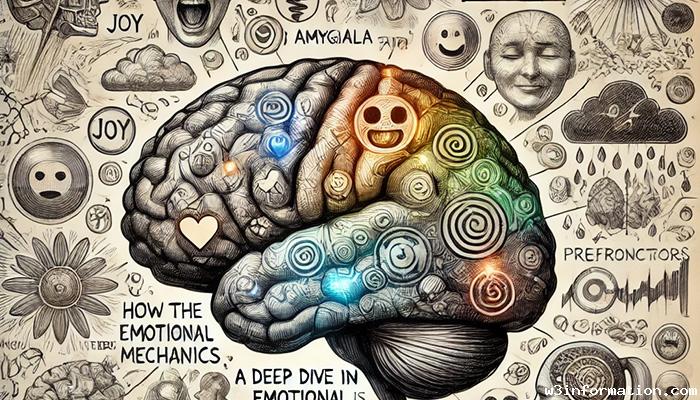How the Brain Processes Emotions: A Deep Dive into Emotional Mechanics
Emotions play a pivotal role in shaping human experience by affecting our choices, interpersonal connections, and general health. Have you thought about the neurological mechanisms that enable your brain to process emotions? The study of emotional science enhances our understanding of human complexity and reveals key insights into mental health and cognitive growth.
The Science of Emotions: A Brain Perspective
Emotional processing within the brain takes place through multiple interacting neural networks. The generation, interpretation, and regulation of emotional experiences occur through the collaboration of multiple brain regions because no single "emotion center" exists.
Key Brain Regions Involved in Emotion Processing
Amygdala
The amygdala functions as the brain's "emotional hub" by playing a critical role in detecting emotional stimuli and generating appropriate responses.
The amygdala maintains a vital function in processing fear responses and detecting threats while establishing emotional memories.
Prefrontal Cortex
The prefrontal cortex manages higher-level cognitive functions while controlling emotional responses.
The prefrontal cortex maintains emotional control and facilitates decision-making and social interactions through the evaluation of emotional responses.
Hippocampus
The hippocampus collaborates with the amygdala to establish connections between emotions and memories.
This function allows us to connect specific sensory experiences with emotional memories by associating smells or songs with positive memories.
Hypothalamus
The hypothalamus serves as a connection point between the brain and body while initiating physical reactions to emotional states.
Through its control of autonomic functions the body can exhibit increased heart rate when fearful or relaxation when experiencing joy.
Insula
The insula interprets physical sensations that accompany emotional states including stomach butterflies or a fast heartbeat.
This function plays a vital role in self-awareness and empathy through its ability to link physical sensations with emotional experiences.
The Emotional Pathway: From Stimulus to Response
The brain processes emotional triggers through specific sequential stages when we encounter them.
Detection: The amygdala functions to detect and determine the emotional value of different stimuli such as smiles or threats.
Interpretation: The prefrontal cortex processes the stimulus by determining its contextual importance and relevance.
Response: The hypothalamus generates physical responses and different brain regions construct our conscious emotions and actions.
Regulation: The prefrontal cortex and amygdala exchange signals through feedback loops to modify emotional responses when necessary.
Emotions and Neurotransmitters
Chemical messengers known as neurotransmitters allow the brain to carry out emotional processing.
- Dopamine: Linked to reward and pleasure.
- Serotonin: Regulates mood, promoting feelings of well-being.
- Cortisol: Associated with stress and the fight-or-flight response.
- Oxytocin: Enhances bonding, trust, and social connections

Why Understanding Emotion Processing Matters
Mental Health: When emotional processing becomes imbalanced people may develop conditions such as anxiety, depression or PTSD. Therapists can create specific treatments by learning these mechanisms.
Emotional Intelligence: Understanding emotional processing supports both personal self-awareness and effective interpersonal communication abilities.
Technology and AI: Research into human emotions provides foundational knowledge that helps create empathetic artificial intelligence systems and mental health technologies.
Challenges in Emotional Research
Neuroscience has achieved important advancements yet numerous unanswered questions about the brain persist. The subjective nature of emotions and their dependence on personal experiences make these feelings difficult to measure and analyze.
Conclusion
The brain demonstrates its complex structure and adaptive capacity through its ability to process emotions. Studying the complex neural connections and chemical signals that govern emotions leads to increased self-understanding and improved emotional health support. Scientific advances will lead to ongoing transformation in mental health care as well as education and technology through future discoveries.
 Top 10 Comfort Foods to Try This Winter
Top 10 Comfort Foods to Try This Winter
 Top 10 Christmas Destinations Around the World
Top 10 Christmas Destinations Around the World
 Navigating Adolescence: Tips for Parents and Teens
Navigating Adolescence: Tips for Parents and Teens
 How to Start a DIY Craft Project on a Budget
How to Start a DIY Craft Project on a Budget
 How to Build Strong Family Bonds in the Digital Age
How to Build Strong Family Bonds in the Digital Age
 The Importance of Early Childhood Education
The Importance of Early Childhood Education